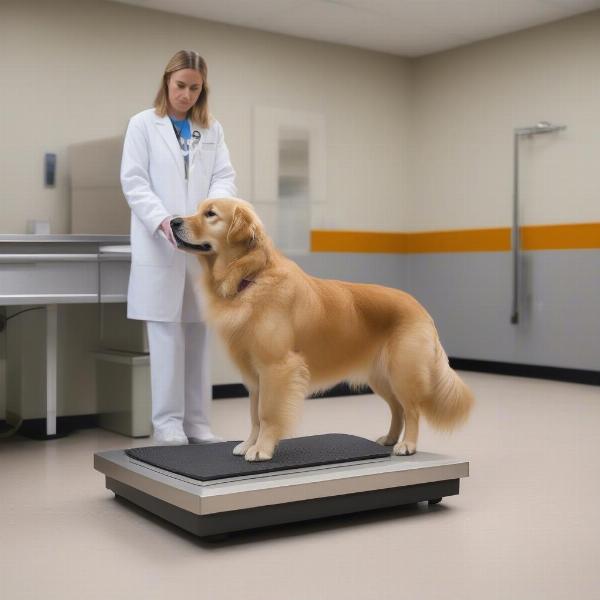Knowing your dog’s weight is crucial for their overall health and well-being. Pet scales for dogs provide a convenient and accurate way to monitor weight fluctuations, ensuring you can address any potential health issues promptly. From choosing the right scale to understanding weight management, this article will cover everything you need to know about using pet scales for dogs.
Choosing the Right Pet Scale for Your Dog
Selecting the appropriate pet scale depends on various factors, including your dog’s size, age, and temperament. For small dogs and puppies, a compact digital scale designed for smaller animals is ideal. For larger breeds, a platform scale or walk-on scale offers a more stable and comfortable weighing experience. Consider features like non-slip surfaces, easy-to-read displays, and a hold function that locks in the weight reading, especially useful for wriggly pups.
Why Accurate Weight Monitoring Matters
Regularly weighing your dog allows you to detect even subtle weight changes that might indicate underlying health problems. Early detection of weight gain or loss can be vital in managing conditions like obesity, heart disease, and diabetes.  Dog Being Weighed on a Platform Scale Additionally, accurate weight monitoring is essential for administering proper medication dosages, ensuring your dog receives the correct amount based on their current weight.
Dog Being Weighed on a Platform Scale Additionally, accurate weight monitoring is essential for administering proper medication dosages, ensuring your dog receives the correct amount based on their current weight.
Monitoring Weight During Puppyhood and Senior Years
Puppies require frequent weighing to ensure healthy growth and development. Regular monitoring allows you to track their progress and make necessary adjustments to their diet. seborrhea shampoo for dogs Similarly, senior dogs often experience changes in metabolism and activity levels, making regular weight checks important for managing age-related health issues.
How to Use a Pet Scale Effectively
While using a pet scale seems straightforward, certain techniques can enhance accuracy and minimize stress for your dog. Start by introducing the scale gradually, allowing your dog to sniff and explore it without pressure. Rewarding them with treats and positive reinforcement can create a positive association with the weighing process. dog scale for large dogs For anxious dogs, consider placing a familiar blanket or toy on the scale to create a more comfortable environment.
Tips for Weighing a Wriggly Dog
If your dog tends to fidget, a platform scale with raised sides can help prevent them from stepping off during the weighing process. Alternatively, you can try gently holding your dog while they are on the scale, ensuring they are standing still and evenly distributed on the platform.
Understanding Your Dog’s Ideal Weight
While pet scales provide the raw data, understanding your dog’s ideal weight requires considering factors like breed, age, and body condition score. Your veterinarian can help you determine your dog’s ideal weight range and provide guidance on appropriate weight management strategies. hip and joint medication for dogs Regular veterinary check-ups are crucial for discussing weight-related concerns and developing a personalized health plan.
Conclusion
Pet scales for dogs are valuable tools for responsible pet ownership. By accurately monitoring your dog’s weight, you can ensure they stay healthy and address potential health concerns promptly. dog scales Choosing the right scale, understanding your dog’s ideal weight, and utilizing effective weighing techniques can make a significant difference in your dog’s overall well-being.
FAQ
- How often should I weigh my dog? For puppies and senior dogs, weekly weighing is recommended. For adult dogs, monthly weighing is generally sufficient.
- What is body condition scoring? Body condition scoring is a method of assessing your dog’s weight based on visual and tactile examination.
- Can I use a human scale to weigh my dog? Human scales might not be accurate for smaller dogs or puppies.
- What should I do if my dog’s weight fluctuates significantly? Consult your veterinarian to rule out any underlying health issues.
- Are there specific scales for different dog breeds? While there aren’t breed-specific scales, choosing the right size and type of scale is crucial.
- How do I introduce my dog to a new pet scale? Gradually introduce the scale with positive reinforcement and rewards.
- What are the signs of obesity in dogs? Difficulty breathing, lethargy, and reduced mobility are common signs of obesity.
Related Articles
ILM Dog is your trusted global resource for expert canine care and nurturing advice. We’re dedicated to providing practical, reliable information on every aspect of dog ownership, from breed selection to senior care, health, nutrition, training, and much more. Our expertise covers all aspects of dog ownership. Contact us for professional guidance: Email: [email protected], Phone: +44 20-3965-8624. Visit ILM Dog for comprehensive resources and support for a happy, healthy dog.